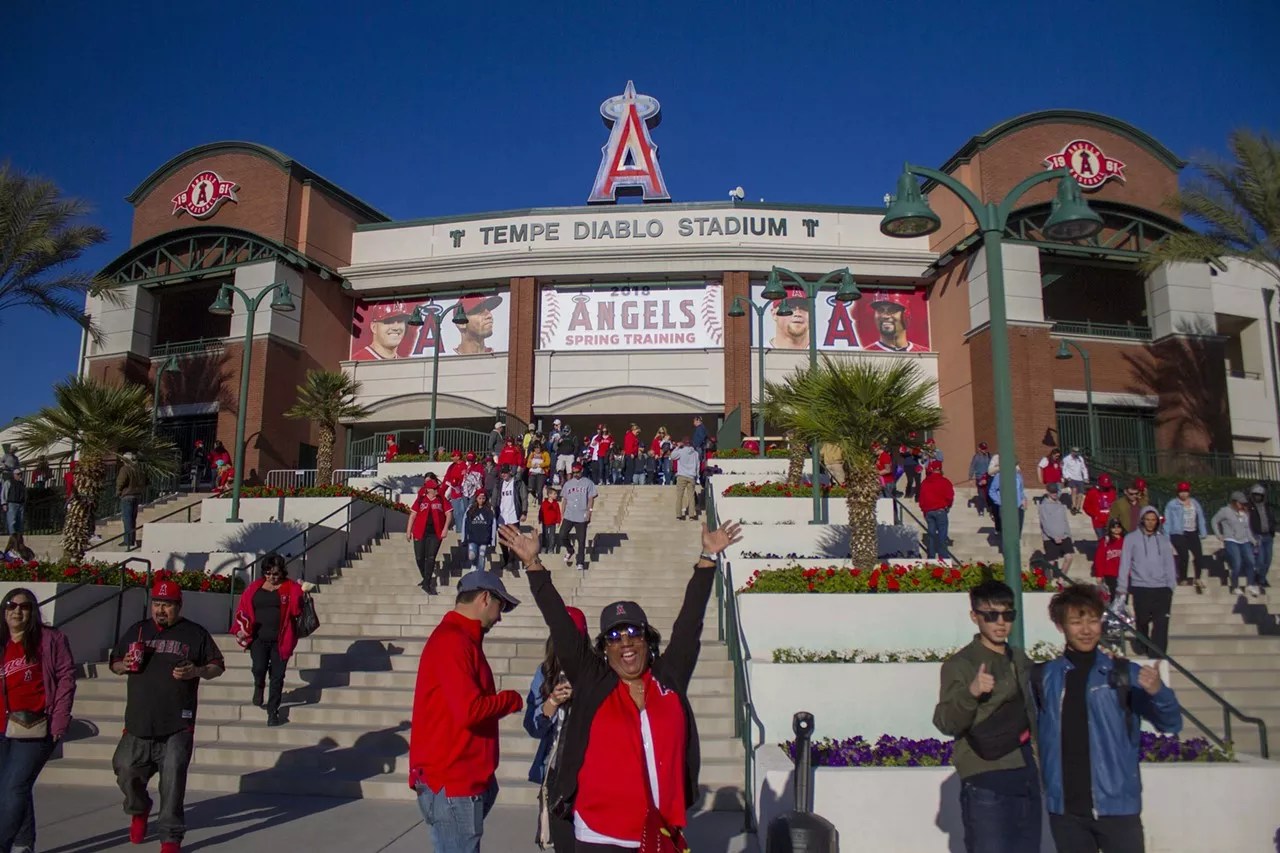
Getty Images

Audio By Carbonatix
The most expensive player in sports history. Both of last year’s pennant winners. Sunny Arizona weather and ballpark dogs.
Spring training is returning to the Valley. Two of the 15 teams you can catch across town are the Arizona Diamondbacks and Texas Rangers, who squared off in last year’s MLB World Series.
Arizona’s spring preseason, known as the Cactus League, runs from Thursday to March 26 at 10 ballparks across the Phoenix metropolitan area. The 2024 Cactus League schedule can be found at CactusLeague.com.
The chance to catch the pros preparing for the season in Arizona’s beautiful winter weather brings a major crowd to the Valley. Last year, Cactus League games drew more than 1.5 million fans, according to Cactus League spokesperson Andrew Bagnato. That’s about 7,246 per game.
The league is a staggering boon for the state’s economy, the Valley’s cities and local businesses. Last year, spring training generated $418.5 million for Arizona’s gross domestic product, according to a study by Arizona State University’s W.P. Carey School of Business. The study also found that the Cactus League generated $36.6 million in tax revenue for the state and $8.2 million for local governments.
Bridget Binsbacher, executive director of the Cactus League, told Phoenix New Times that she’s been watching the evolution of Arizona’s spring training since 1994, when the Peoria Sports Complex opened.
“It has become an industry all its own. It’s absolutely the equivalent of a mega-sporting event,” Binsbacher said. “The thing that makes it unique is that it happens every year, it lasts four weeks and plays out across the entire Valley.”
Binsbacher said spring training was “one of the top drivers of tourism” in the state. Three out of five attendees are from out of state, and 22% of fans reported they would visit another part of Arizona during their trip to catch the spring action.
Cactus League play in 2023 was the first normal preseason since 2019. Spring training was suspended in 2020 thanks to the coronavirus pandemic, which also limited fan capacity for the 2021 preseason. In 2022, a labor dispute between MLB and its players union postponed Cactus League play until mid-March, making the preseason only 18 days long.
“We went through a lot, definitely,” Binsbacher said. “Last season was a rebirth for spring training in the Valley. Now we’re looking to build on that in 2024. We’re expecting a great season, especially not having any modifications or restrictions.”

Lourdes Gurriel Jr. celebrates in the clubhouse on Oct. 24 after the Arizona Diamondbacks won the National League Championship Series in Game 7.
Tim Nwachukwu/Getty Images
Watch D-Backs, Rangers clash in spring training
Binsbacher and other Cactus League leaders noted that in the past, interest and ticket sales increased when World Series teams took to the desert diamond.
“We’re definitely expecting a surge in attendance for the Rangers and the Diamondbacks coming off the World Series,” she said.
The Diamondbacks play at Salt River Fields on the Salt River Pima-Maricopa Indian Community near Scottsdale, and the Rangers train at Surprise Stadium.
Dave Dunne, general manager of Salt River Fields, told New Times that compared with mid-February of last year, Diamondbacks ticket sales are up 20%. Ticket sales are particularly high for the Feb. 28 game when the D-backs host the Rangers.
“With the Diamondbacks being the defending National League champs, it looks like we’re gonna have a really solid year in ticket sales,” Dunne said. “There’s just so much interest in that team. The younger players have really caught on with the fans.”
Offseason moves by the Diamondbacks also are getting fans excited about spring training.
The D-backs finished the regular season at 84-78 last year, barely making the playoffs before going on an improbable run to the World Series. They were bested by the Texas Rangers in the Fall Classic, however, winning only one game.
The two teams will square off three times during spring training: once at Salt River Fields and twice at Surprise Stadium.

Tempe Diablo Stadium is the oldest and the smallest ballpark in the Cactus League but also one of the most scenic.
Blake Benard
How to catch Shohei Ohtani in Cactus League play
Both Binsbacher and Dunne offered advice for fans looking to attend Cactus League games.
According to Binsbacher, the first two weeks are not quite as well-attended, which makes tickets for those games more affordable. “It’s a great opportunity for local residents to get great tickets before out-of-state visitors hit the Valley,” Binsbacher said.
She also noted that there is elevated excitement around Shohei Ohtani, the Dodgers phenom who was signed in the offseason to a 10-year, $700 million contract, the largest in professional sports history.
“We want to remind fans that if they want to see Ohtani and the Dodgers or the Padres, they need to do that before March 13, because that’s when they head to South Korea,” Binsbacher said.
Dunne also advised fans to buy tickets directly from the stadium to avoid paying the fees tacked on in resale markets. “You buy them for the direct price, and it’s a lot better than buying them for a secondary market price,” Dunne said.
Ticket prices vary by team, stadium and seat. As of Feb. 16, Rangers home tickets are on sale for about $8 to $60. D-backs home tickets range from about $24 to $100.